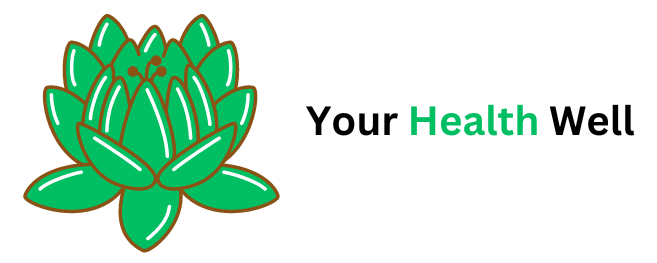Ever thought about how your gut health affects your overall wellness? Scientists have found that the gut microbiota, a complex group of bacteria in your digestive system, does more than just help with digestion. It also affects your immune system, mood, and even your skin. But what foods should you eat daily for a balanced gut?
This guide will show you which foods boost your gut health. We’ll talk about probiotics, prebiotics, fiber-rich foods, and anti-inflammatory foods. These are key to making your diet gut-friendly. By understanding these power foods, you can improve your digestive health and overall well-being. Let’s start exploring the best foods for a happy, healthy gut!
Quick Recommendation: Our blog takes you through the correlation between superfoods and gut health. If you're interested in exploring the many health benefits of super foods more comprehensively, we recommend The Encyclopedia of Power Foods.
Understanding Gut Health
When we talk about gut health, we mean the balance of tiny organisms in our digestive system. These tiny beings are key to a smooth digestive process, help with metabolism, and support our mental health.
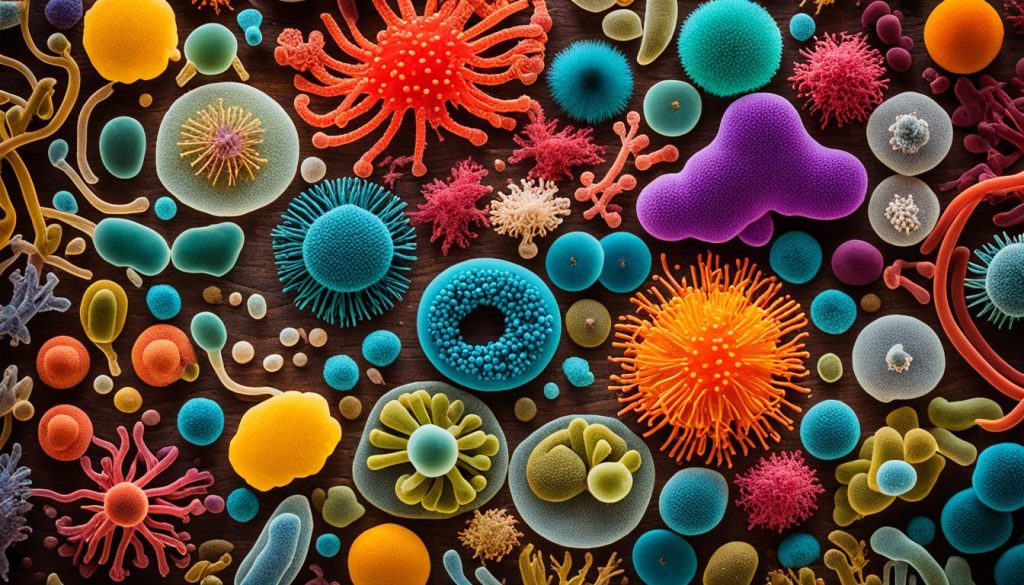
Studies show that a balanced gut microbiota is crucial for our digestion and immunity. A healthy digestive system makes sure we absorb nutrients well and keeps infections away. Keeping our gut healthy can prevent many digestive problems and diseases like IBS, Crohn’s disease, and some cancers.
Poor gut health can cause bloating, gas, or even serious issues like chronic constipation or diarrhea. Ignoring our gut can affect our health in big ways, not just in our digestive system.
To keep our gut healthy, we need a good diet, lifestyle changes, and sometimes probiotics. Learning about gut health can help us make better choices for our digestive system.
Probiotics: Your Gut’s Best Friend
Probiotics are key for a healthy gut. They are live microorganisms, like Lactobacillus and Bifidobacterium, that help you stay healthy. Eating foods rich in probiotics, such as yogurt, kefir, and kimchi, boosts your gut health.
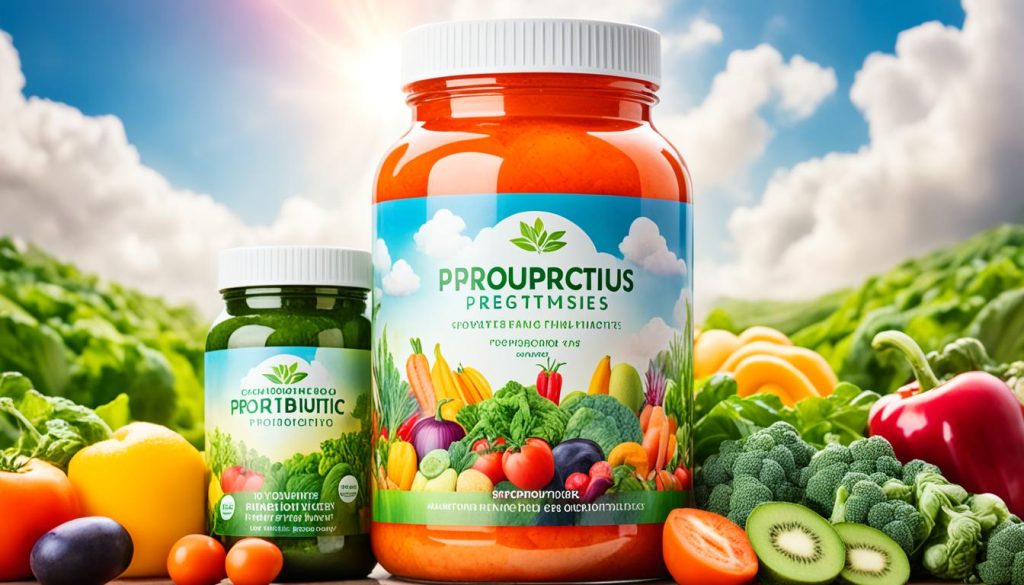
Adding these fermented foods to your meals balances your gut flora. Studies show that probiotics improve digestion and boost your immune system. This makes you less likely to get sick. The microbes, Lactobacillus and Bifidobacterium, help get rid of bad bacteria and keep your digestive tract healthy.
To get the most from probiotics, eat a mix of these fermented foods. You can add yogurt to breakfast, drink kefir in the afternoon, or have kimchi with dinner. These simple changes can greatly improve your gut health.
Prebiotics: Fuel for Your Gut
Prebiotics are a special kind of fiber that your body can’t break down. They feed the good bacteria in your gut, helping them grow strong. Foods like garlic, onions, and bananas are full of prebiotics. Eating these foods helps your gut bacteria and boosts your health.
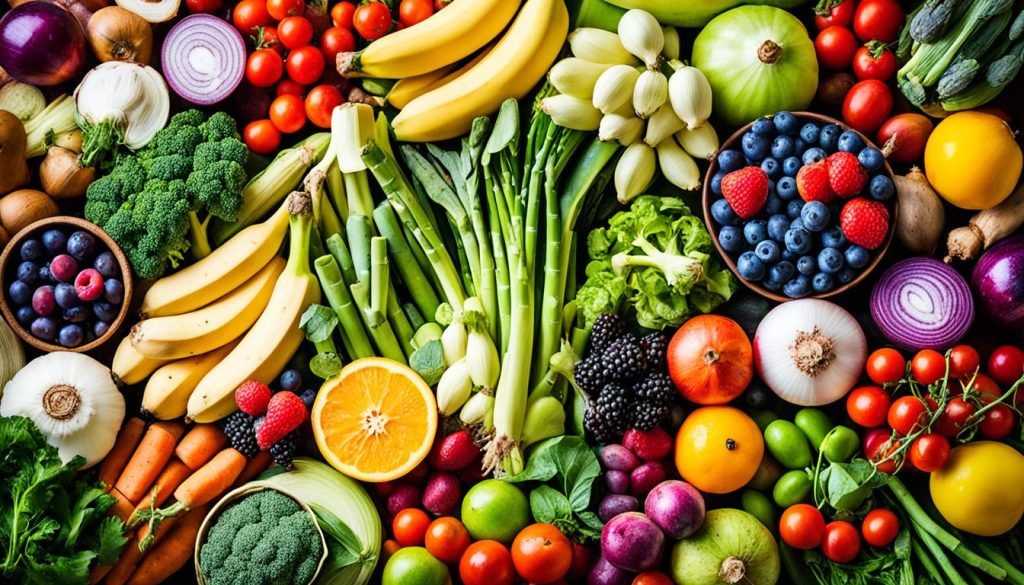
Garlic is packed with inulin, a prebiotic fiber that helps good gut bacteria grow. Adding garlic to your meals supports your gut health. Onions have fructooligosaccharides (FOS), another prebiotic that helps keep your gut healthy.
Bananas are great for prebiotics, especially when they’re a bit green. These bananas have more resistant starch, a fiber that acts as a prebiotic. Eating these fibers keeps your gut microbiome strong and balanced.
It’s important to eat both probiotics and prebiotics for good gut health. Studies show that these two work together to improve digestion and overall health. So, when you eat foods like garlic, onions, and bananas, you’re not just tasting good food. You’re also feeding your gut for better health.
Fiber-Rich Foods for a Healthy Gut
When you think about keeping your gut healthy, think of dietary fiber. It’s key for a smooth digestive system. There are two main types: soluble and insoluble. Both are important for your gut.
Soluble fiber dissolves in water, forming a gel-like substance. This helps lower blood cholesterol and control blood sugar. Insoluble fiber doesn’t dissolve in water. It adds bulk to your stool, making it easier to pass and helping with regular bowel movements.
Adding both soluble and insoluble fiber to your diet is good. It can prevent issues like constipation, diverticulitis, and irritable bowel syndrome.
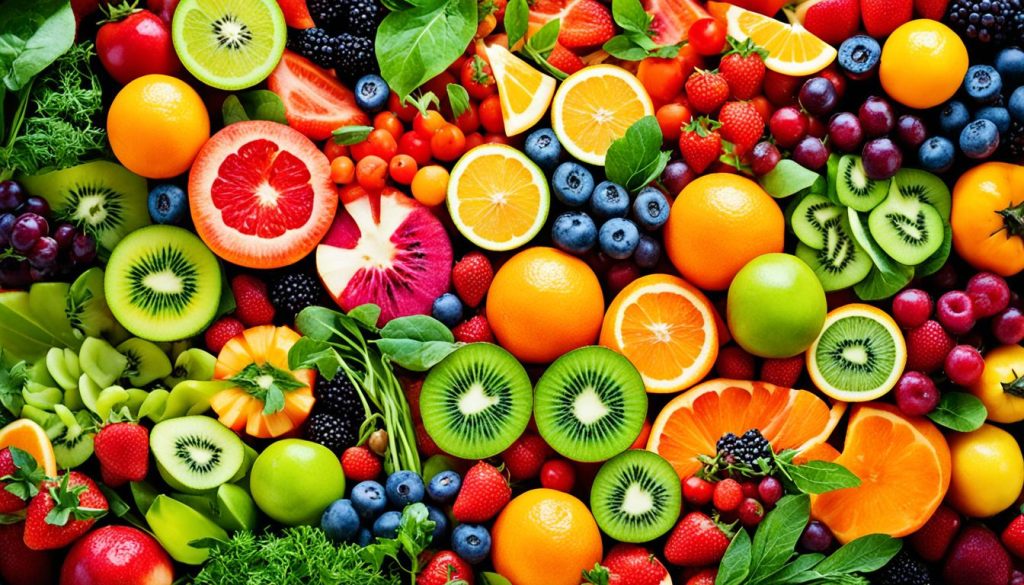
Adding fiber-rich foods like whole grains, nuts, seeds, and legumes is great for your gut. Think about eating oatmeal, quinoa, brown rice, and barley. These foods are full of dietary fiber and provide important nutrients and energy.
Don’t forget about fruits and vegetables. They’re full of soluble and insoluble fiber. Apples, pears, berries, and leafy greens are great for your digestive health. Eating a variety of these foods gives you different fibers and vitamins and minerals you need.
Keeping a diet full of dietary fiber is key for a healthy gut. By eating whole grains, nuts, seeds, legumes, and many fruits and vegetables, you’ll boost your digestive health. This also supports your overall well-being.
Quick Recommendation: Our blog takes you through the correlation between superfoods and gut health. If you're interested in exploring the many health benefits of super foods more comprehensively, we recommend The Encyclopedia of Power Foods.
Anti-inflammatory Foods for Gut Health
Understanding how inflammation affects gut health is key to solving digestive problems. Eating foods that fight inflammation can make your gut healthier. Foods high in omega-3 fatty acids like salmon and flaxseeds are great for this.
Leafy greens, such as kale and spinach, are full of antioxidants. These protect the gut lining and help keep your digestive system healthy. They’re also low in calories but full of vitamins and minerals, making them perfect for an anti-inflammatory diet.
Berries, like blueberries, strawberries, and raspberries, are loaded with antioxidants. Adding these fruits to your meals can help reduce gut inflammation. Research shows that their antioxidants can ease gut issues and boost overall digestive health.
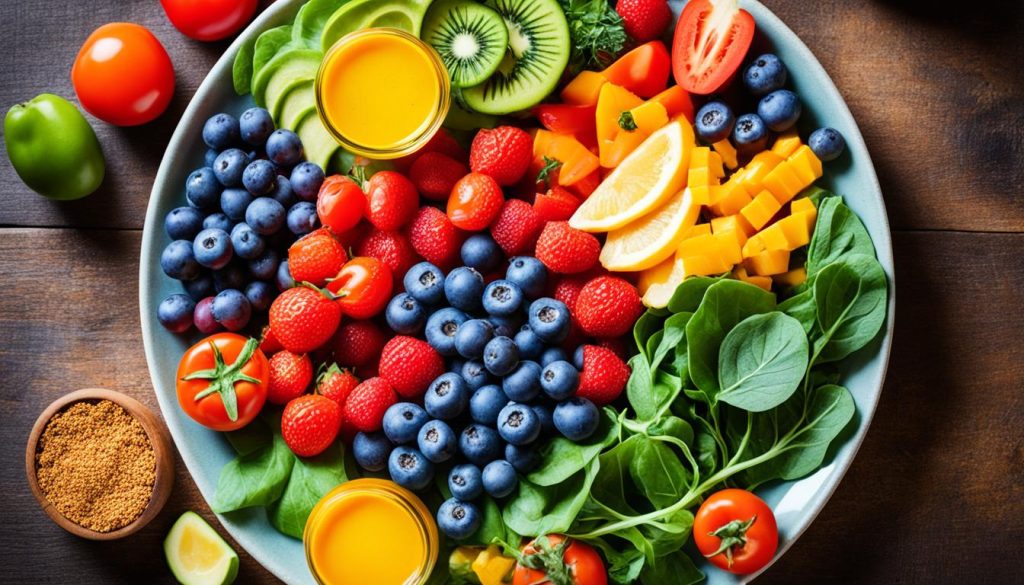
Adding these foods to your daily meals can greatly improve your gut health. By eating an anti-inflammatory diet full of omega-3 fatty acids and antioxidants, you’re helping your digestive system stay healthy and happy.
The Role of Hydration in Gut Health
Your water intake is key to a healthy gut. It helps your digestive function work smoothly, making it easier to break down food.
Many people don’t realize how important drinking enough water is for their gut health. Drinking enough water helps avoid constipation and keeps your digestive tract well-lubricated.
Eating hydrating foods like cucumbers and watermelons also helps keep your body’s fluids in balance. These foods are full of water and give you important nutrients too.
Research shows that staying hydrated is good for your gut motility. It helps food move better in your stomach. Drinking enough water keeps your digestive system working well and efficiently.
Herbs and Spices: Natural Boosters for Gut Health
Adding herbal remedies and gut health spices to your diet can greatly help your gut health. Ginger is a key player here. It’s known for reducing inflammation and soothing the digestive tract. This makes it a great choice for anyone looking to improve their digestion.
Turmeric is another spice that stands out for gut health. It’s full of curcumin, which supports a healthy gut microbiome. Turmeric’s anti-inflammatory effects also help with digestion. Adding it to your meals can make a big difference in your gut health.
Peppermint is great for those looking for natural ways to ease digestion. It relaxes the gut muscles, helping with symptoms of irritable bowel syndrome (IBS). You can enjoy peppermint in tea or as an essential oil for its gut benefits.
These herbal remedies and gut health spices do more than just add flavor. They are crucial for a healthy digestive system. By using these natural digestive aids daily, you can support your gut health and enjoy a balanced gut microbiome.
Foods to Avoid for Optimal Gut Health
Some foods help keep your gut healthy, but others can harm it. Processed foods are full of preservatives that can mess with your gut bacteria. Foods high in sugar also aren’t good for your gut. They feed bad bacteria and yeast, causing problems with digestion.
Be careful with food additives too. They can inflame your gut and cause digestive issues. You’ll find these in snacks and drinks, so always check the labels. Experts agree that these foods can hurt your gut health. They suggest eating natural foods instead.
To keep your gut in good shape, choose whole, natural foods over processed ones. Cut down on sugar and artificial additives too. Doing this will help you avoid irritants and keep your gut balanced for better health.
Conclusion
This guide on power foods for gut health wraps up with a key message. Keeping your gut healthy is complex but rewarding. By knowing how your gut affects your overall health, you’re already on the right track.
Adding the right probiotics and prebiotics to your meals helps your gut. Foods high in fiber and those that fight inflammation also support your digestive system.
Drinking enough water is crucial for gut health. It keeps your digestive tract working well. Also, using herbs and spices can naturally boost your gut health.
But, it’s important to avoid foods that harm your gut. This keeps you on the path to feeling your best.
A balanced diet is key to good gut health. Choosing foods that help your digestive system can improve your energy, mood, and overall health. Keep learning and adding these foods to your daily meals for a healthier life.
Now is the best time to start making these changes. Begin today, and remember, a happy gut means a happy life.
Quick Recommendation: Our blog takes you through the correlation between superfoods and gut health. If you're interested in exploring the many health benefits of super foods more comprehensively, we recommend The Encyclopedia of Power Foods.
